Noraseri – The Hajji Shahab Family
March 23, 2006
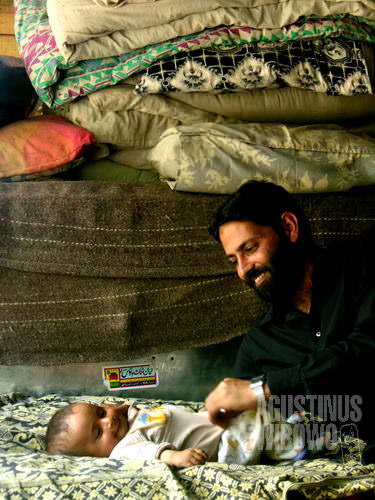
Tajjamal and his cousin
The relation with Taj Mahal brought me back to the Hajji Shahab’s house. Hajji Shahab, an old man who died recently, whose funeral was photographed by me in my first day in Noraseri, was quite a reputable person in the village. And Tajjamal, or Taj Mahal, was his distant relative. Taj Mahal didn’t come to the funeral day, as he was in Muzaffarabad. This was the first time he came back to Noraseri so it was essential for him to visit the family again to deliver some prayers.
A daughter of Mr. Hajji came late in the funeral day, so she didn’t have the chance to evidence her father’s face for the last time. Samera, the name of this daughter, asked me to show her the pictures of the face of the dead father. Samera was in Lahore, and due to road blocks (very common in these rainy days due to the landslides in Kashmir, and the day when Hajji Shahab passed away was also a rainy day) Samera came a day later. Due to my customs, I didn’t take the close up pictures of the face of the dead man. I had given her some prints of the photo of the funeral day, but she expected to see a larger photo. I had met Samera several times before, and quite embarrassed that I hadn’t fulfilled her wish yet.
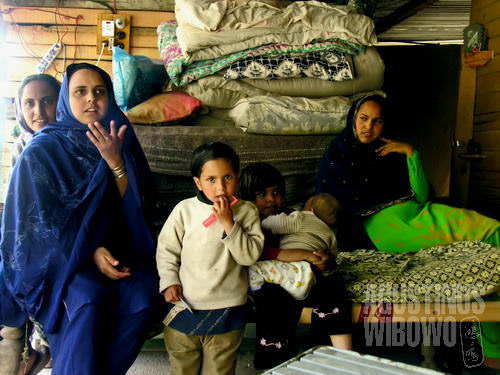
The family of Mister Hajji
The house of Hajji Shahab was full of women and children. He had seven daughters and only one son. Why seven daughters? Because one son was not enough, and the couple wanted to have more sons. But after the only son, God only gave them daughters. The couple gave up of making new children after the seventh daughter. The young daughter, Hafizah, spoke very good English and she told me the story of her family.
The youngest daughter, the beloved and intelligent one, was dead during the earthquake. The house of the family was totally collapsed. And as anywhere in Kashmir, the house was also made of heavy stone bricks. The dead daughter was telephoning her friend when the disaster came, and was not ready to escape. Two little grandchildren of the family also passed away, being heavily flushed by the stones of the house.
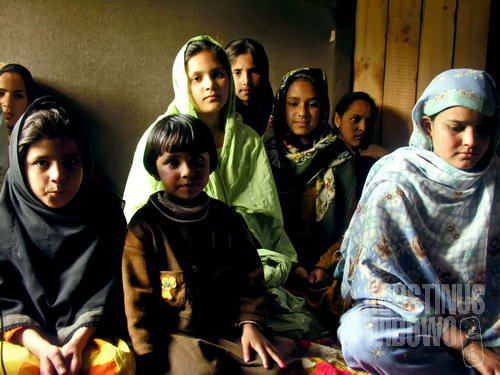
They hold religious gathering regularly
The family was a rich family, noticeable from the size of the collapsed house – now only ruins on the foundation. “We had six rooms,” said Hafizah, “six rooms!”
But now the family stayed in simple shelter homes of which the material was provided by the NGO. And Hafizah also said that now they had to rely on relief supply for daily food. Relying on relief was something that never been expected to happen to this family. It was an ironical joke when the people in this family, also in some other families in the village, pointing one family member’s clothes and saying, “the clothes he wear, relief”. In fact, they had never received clothes.
The background of the big family, Hajji Shahab, born as Sayyid Karim Haider Shah Kazmi, was a Pakistani who worked and lived in Saudi Arabia. He was in the holy country for 38 years. Hafizah proudly stated that her father had done hajj for 7 times. The title ‘Hajji Shahab’ was indeed perfectly matched his history. Hajji Shahab was married with a Saudi, bore their four children in Saudi Arabia. Then the whole family moved back to Pakistan. Hafizah was born in Pakistan, so that she could not get Saudi passport. She, jokingly, regretted her faith.
About his father, Hafizah, 22 years old, was very proud of him. His father was a very hospitable man. Hafizah said that almost every evening his father invited at least one guest to the house to have dinner. And when there was no guest on that day, the father would turn to be unhappy and sighed why there was no guest. Everybody in the village knew about him. The reputation of the family was very high.
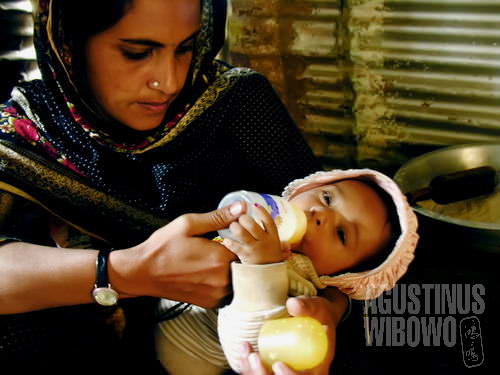
Hafizah noted how beautiful his father was when he died. He died peacefully, just looked like a sleeping man. Now the family was in mourning period of forty days. The fortieth day, the Chehlum, would come nine days after. And they wished me to attend the party.
“There would be much, much food!” Hafizah reminded me.
That day, the widow of Mr. Hajji was also there. She, a middle aged Saudi woman, was a woman with charm and aura. Her face was very peaceful. And her grandchildren was playing around her, crying and laughing loud. Hafizah said that when her mother moved to Pakistan, her Urdu was comparable with my Urdu at this moment. Mrs. Hajji didn’t speak English, but now her Urdu was completely as Pakistani’s. I was actually surprised when Hafizah told me that her mother was Saudi, a foreigner. Her face was completely like a Pakistani. And from the rumors I thought that she was from Balluchistan province.
This time, a little baby of merely six month, was brought into the verandah by Samera, the 25 year old daughter. He was six months old. When the disaster came, the baby was merely one month. And he survived. The baby, Samera proudly noted, was a brave baby. Samera swung the baby, the little creature just smiled. Samera hang the baby and spanned him, the baby was happy. Samera threw the baby to the sky, that poor boy just laughed happily. Samera also laughed proudly.
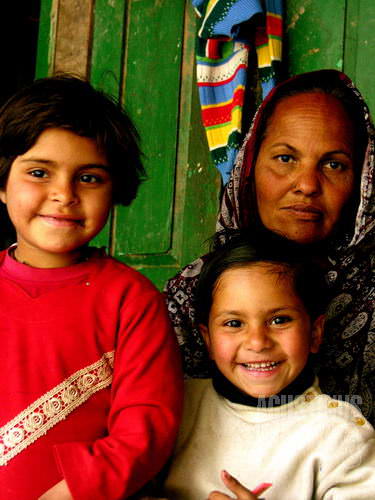
The Grandmother or Bari Amma
Hajji Shahab was proud of Hafizah, as Hafizah was very educated. She was now doing her master degree, and even had diploma in computer. Hafizah was the only one in the family speaking such a perfect English. Hajji Shahab, when he was alive, told everybody proudly that he had an educated daughter. Hafizah was working in hospital, everyday. I asked her whether she would leave her job when she got married, she said no. In fact, her mother was also still working, in the same hospital. The family was not ordinary.
Despite to the fact that the house now was occupied by mostly women, and the family was now lead by a woman, they invited me to spend a night there. These days in Noraseri, everybody was crazy of a jingle in Hindko dialect, “Gay Barhean”, and replied by “Adeta na carhean”. The meaning of the jingle is: I go to Barhean, I waved my hand but the car didn’t stop. Now the village youngsters used “gay Barhean” as salaam, and replied by “adeta na carhean”, then everybody started giggling. I didn’t know why it was funny. I just followed the custom. The other daughters of Hajji Shahab was very amused with my Hindko talk. I asked Hafizah about the jingle. She didn’t know either what funny with “Gay Barhean”. Sometimes stupidity add the color to the life.
Later on that day, I came back to the house again, ready with my little bag. The house was full of girls. There were three men as well. The girls, wearing hejab, were chanting Koran and singing Naat in a separate room. I thought it had something to do with the death of Mr. Hajji. But Hafizah said that because it was weekend, so they had the party. Actually that day was Thursday, and Thursdays were religious days for Muslims. In the villages in Indonesia also people gathered on Thursdays for religious readings.
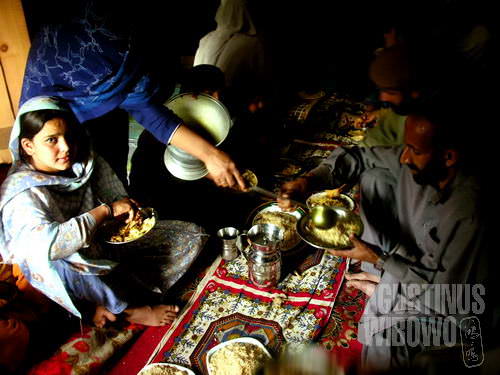
The party after Koran reading gathering
Then the party started. An early dinner. After the prayer delivered by the man, a village imam, the young girls started to sit in rows in the big room of the shelter home. They were happy and noisy. Hafizah distributed the food: biryani rice and meat curry. In Kashmir for parties people tend to eat rice. I didn’t get my food. Hafizah said that I would have together the dinner with the family, the host. At this time I was regarded as part of the family already.
The party was finished. Rice was everywhere on the floor of the room. These young children ate very carelessly. Samera sighed, “Ganda log! (dirty people!)”. With her Urdu Samera can produced some unexpected sentences. The daughters started to clean up the room. Uzma, the younger daughter, and also married, was excited. Samera and Uzma taught me some Hindko sentences, like: “Tum julsi? Men na julta. Tum ko pata? Mu ko ni pata.” Means: you go? I not go. You know? I not know.
Another meaningless conversations.
But it was enough to bring laughter.
And indeed the whole family, the women with their children, were always happy, laughing and joking around.
Uzma insisted that I should be her brother, and she was my sister. Despite of the feeling of nervousness in a Pakistani house with women (in Pakistan a man might be hesitant to invite you to his house if there is woman in the house), I felt ease with this kind of sisterly love.
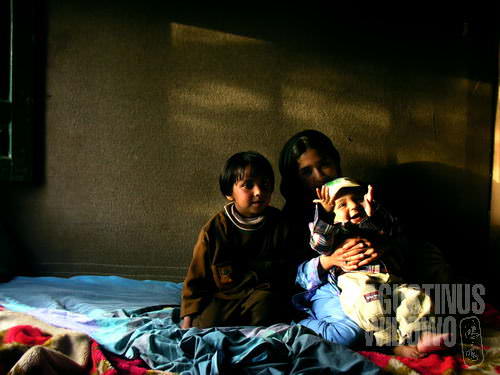
Children from the neighborhood
The mother was not in the scene. Even she was not in the party. She didn’t join the daughters and grandchildren (also me) chatting and eating in the room in the evening. It seemed that she didn’t enjoy the noise. This time there were three other men. One is the son. The other one was a young boy of eighteen whom Samera fond to beat and slap and cursed “harami!” The third one was Abdul Gafur; Samera called him as Bur shah or samosa wallah. Abdul Gafur was the son of the elder sister of Samera, so he was Samera’s nephew. But Abdul Gafur was 30, five years older than Samera. In big families as in Pakistan, this is not impossible.
Samera had three children. The youngest baby was introduced already earlier, whom Samera put most of her love on. She said she didn’t want to have more children. Family planning. Hafizah was working in the hospital, and I asked her about family planning in Pakistan. She said that it was difficult, due to traditional thinking of the people. She said that Pakistan needed twenty or thirty years to be educated for family planning. Now her work in the hospital included introducing family planning to village families.
Electricity came quite late to Noraseri tonight. And after the superb dinner and laughter, I spent my night in the room, which was used by the girls to read Koran and sing Naat, together with Bur shah and the 18-year-old boy who claimed to have married with a girl from Srinagar. Samera was cooperating with this boy to tell this world’s biggest lie to me. The women and babies slept in the next room soundly.






Leave a comment